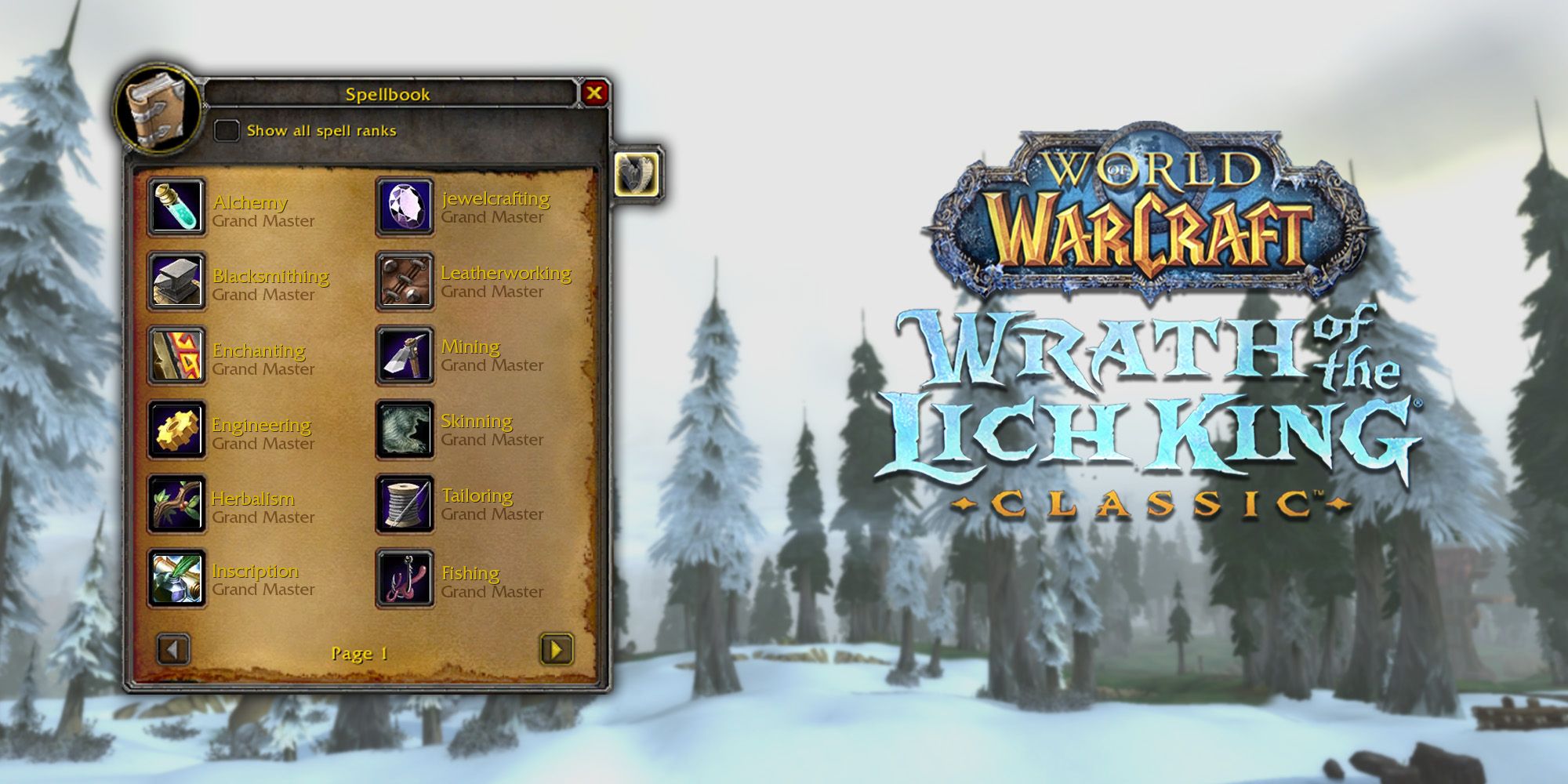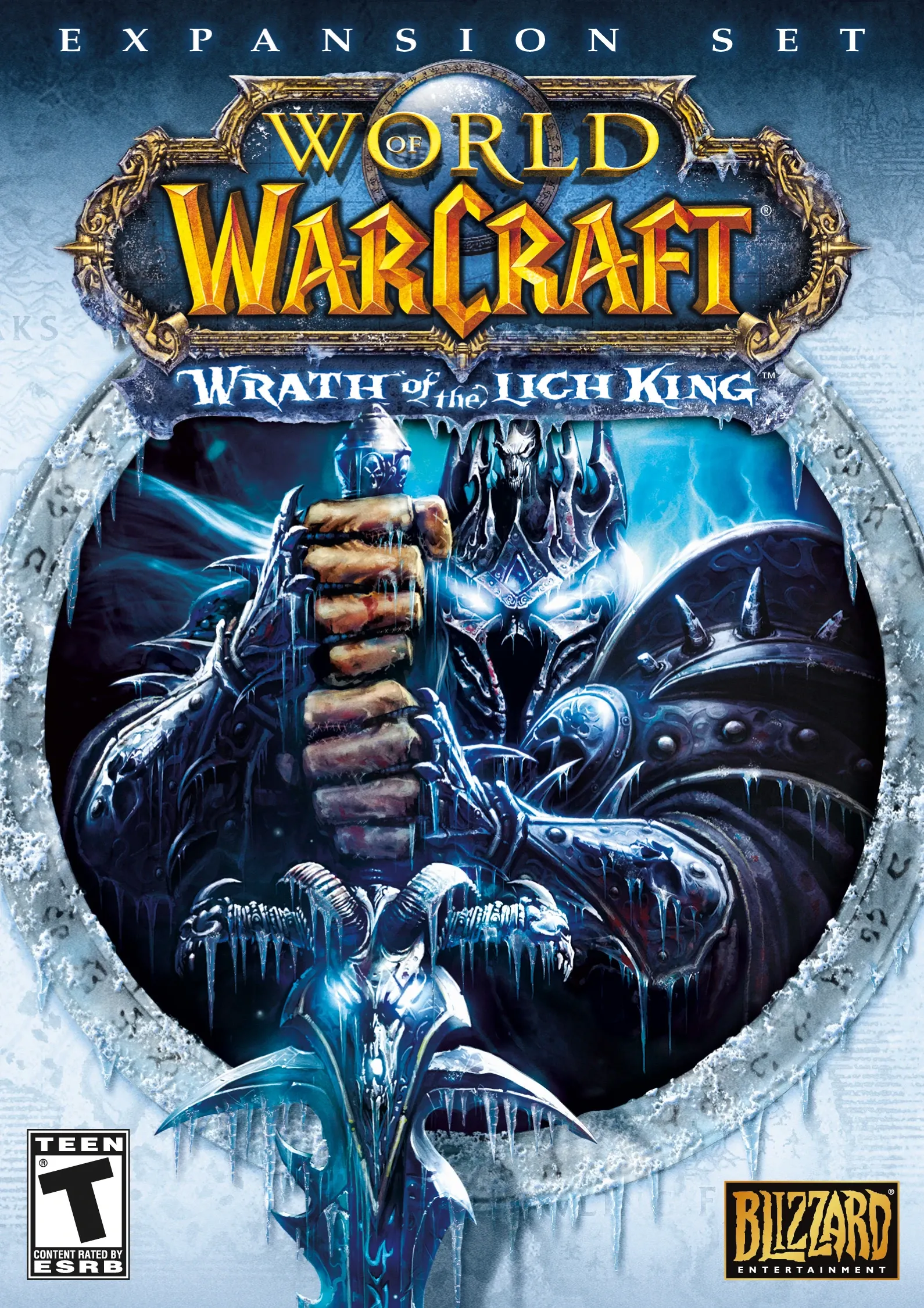Quick Links
Introduction
Professions in World of Warcraft have been an integral system in enhancing a player's gameplay performance since the original release of the game in 2006. With every new expansion, each profession receives an update that typically adds new recipes and materials associated with them. In WoW WotLK Classic, a new profession was added: Inscription. Using herbs gathered from Herbalism, players can create glyphs that augment each class's skills.
With the release of World of Warcraft Classic: Wrath of the Lich King professions receive another critical update making them one of the most important tools in your characters kit. Every profession has its uses and has ways to make gold. Here we’ll be doing a quick overview of all the professions and highlighting the changes that Wrath of the Lich King will bring.
All Professions
There are two different kinds of professions in World of Warcraft, Primary and Secondary professions. Players can learn two primary professions per character as well as all three Secondary Professions on every character.
The Primary Professions are:
- Alchemy
- Blacksmithing
- Enchanting
- Engineering
- Herbalism
- Inscription
- Jewelcrafting
- Leatherworking
- Mining
- Tailoring
- Skinning
The Secondary Professions are:
- Fishing
- Cooking
- First Aid
All professions are further classified separately: Gathering or Crafting. Gathering professions allow you to acquire materials from out in the World. While Crafting professions allow you to further refine those materials to make a wide variety of different items such as armor, weapons, accessories, consumables, etc.
Leveling Guides
Best Professions For Every Class
All professions provide a bonus to stats in some way, but some are more powerful than others. Here are the top three professions that all classes can benefit from.
#1: Engineering
By and large, almost all classes can benefit from the many useful tools and buffs that Engineering provides. Not only are there a number of useful tools, but there are plenty of items and enchants that increase a player's effectiveness in both PvE and PvP environments.
Tools:
Equipment:
- Best in Slot Head Piece such as Charged Titanium Specs, Weakness Spectralizers, and Visage Liquification Goggles
Enchants:
- Boots: Nitro Boosts
- Gloves: Hyperspeed Accelerators
- Back: Springy Arachnoweave or Flexweave Underlay
-
Bracers: Frag Belt
- Can be used in addition to Eternal Belt Buckle.
- Head: Mind Amplification Dish
- Waist: Personal Electromagnetic Pulse Generator
- Ranged: Heartseeker Scope
Explosives:
#2: Jewelcrafting
Jewelcrafting is a good second profession for the sole reason that any class benefits from the items crafted with it. It is a good source of equipment, such as Necklaces, Rings, and Trinkets and the 3 Jeweler's Gems provide the same stat bonuses as other professions. It Is also a great source of gold from the Daily Jewelcrafting Quest, Prospecting, selling, or cutting Gems.
#3: Tailoring
Tailoring is a great second profession for Cloth wearers in particular. It provides the best back enchant for many classes, and they are exclusive to Tailors:
It also is a great option simply to gather Frostweave Cloth with the A Guide to Northern Cloth Scavenging to sell or for use in bandages, bags, and other equipment.
Proficiency Brackets and Level Cap
Whether players are returning to Wrath of the Lich King as their first interaction of Classic or if they’re continuing their journey through Azeroth they’ll find that professions will be more important than ever.
The level cap for professions is increased from 375 to 450. The items that players can craft get stronger as they level up. Around level 400 is when players will begin to see very powerful recipes. These can be used for to their own characters, but they can also generally be sold to other players for a profit. We go over this in greater detail in the profession-specific guides.
Whether you’re looking to swap professions or level one from scratch on a new character, some professions require more time and gold invested into them. Here are the leveling brackets and new level cap for Wotlk:
Classic: Azeroth (1 - 300)
Provides items for Characters Level 1 - 60 and has several level brackets:
- Apprentice (1 - 75): Requires Level 5
- Journeyman (50 - 150): Requires level 10
- Expert (125 - 225): Requires Level 20
- Artisan (200 - 300): Requires Level 35
The Burning Crusade: Outland (275 - 375)
Provides items for Characters Level 58 - 70 and has one level bracket:
- Master (275 - 375): Requires Level 45
Wrath of the Lich King: Northrend (350 - 450)
Provides items for Characters Level 68 - 80 and also has one level bracket:
- Grand Master (350 - 450): Requires Level 55
The level brackets overlap so that you can start crafting certain materials that are required for the next bracket as they are often components used in the next bracket.
Common Profession Pairings
As players are limited to only two Primary Professions per character, players will often pair one profession with another one that complements it. Many Crafting Professions require materials that are generally obtained from a specific Gathering Profession. The table below indicates the professions, their type (Crafting or Gathering), and which ones are complementary to each other.
| Primary Profession | Type | Complementary Profession(s) | Information |
|---|---|---|---|
| Alchemy | Crafting | Herbalism | Herb Nodes gathered via Herbalism supply the bulk of materials. Fishing also provides various ingredients for a number of recipes. |
| Blacksmithing | Crafting | Mining | Ore Nodes gathered via Mining supply a lot of the materials necessary. |
| Enchanting | Crafting and Gathering | Tailoring | Enchanting and Tailoring both do not require another profession to gather their materials. Therefore, many players Disenchant the crafted items from Tailoring to provide materials for Enchanting. |
| Engineering | Crafting | Mining | Ore Nodes gathered via Mining supply a lot of the ores, stone, and gems necessary. |
| Herbalism | Gathering | Alchemy, Inscription | Supplies Herbs for Alchemy Potions and Inscription pigments |
| Inscription | Crafting | Herbalism | Mills Herbs into Pigments for Inks. |
| Jewelcrafting | Crafting | Mining | The gems required for Jewelcrafting are only supplied via Mining Ore Nodes or as loot. |
| Leatherworking | Crafting | Skinning | Leatherworking relies almost entirely on Skinning to supply scraps that are used in the majority of recipes. |
| Mining | Gathering | Blacksmithing, Engineering, Jewelcrafting | Mining Ore Nodes provides supplies the majority to all of these professions and sometimes to others as well. |
| Tailoring | Crafting | Enchanting | Tailoring receives the majority of its supplies from looting humanoids. Disenchanting items provides a good opportunity to save gold for some materials. |
| Skinning | Gathering | Leatherworking | Skinning beasts provides leather and scraps mostly for Leatherworking and sometimes for other professions. |
Skill-Up Leveling Success Percentages
The chance of success to gain a skill level in a profession, aka “skill-up” is dependent on the recipe you are crafting and your current level.
|
Orange |
100% |
|---|---|
|
Yellow |
99%-50% |
|
Green |
49%-1% |
|
Grey |
0% |
The exact percent chance of a skill-up for any given recipe is as follows:
- (Grey Level - Your Current Skill Level) / (Grey Level - Yellow Level)
So for example, a recipe has the following skill-up thresholds: 1 25 37 50. If you were trying to determine the chance of success at level 39 the calculation would be as follows:
- (50-39)/(50-25) = 44%
Also, remember that each attempt is independent of the previous attempt. Therefore, it is impossible to calculate exactly how many crafting attempts and materials you will need to skill up. The exception is if you were to only ever craft when a recipe is still Orange. However, if a recipe just became yellow and the next recipe requires more materials, it may be wise to craft the previous recipe a few more times as the skill-up success rate is likely very high.
For this reason, you will see the "approximately" symbol (~) used in recipes where there is a chance of failure to skill up and therefore hard to determine exact quantities.
Changing Professions
It's generally ill-advised to switch professions, as it requires completely unlearning the profession as well as any recipes you may have learned. If you do decide to relearn it again you will have to start from level 1 all over again. However, players will often initially level complementary professions together, but upon reaching max level keep only one crafting profession to refine materials into goods for sale. The second profession is then switched out to a different crafting profession for various items for personal use or as another method of gold making. This can often be very expensive as you will now have to solely rely on buying materials from other players or the Auction House in order to craft. The other option is to also have a second character become a Gathering-only character (usually a Druid; for better movement speed), having two Gathering professions, providing the necessary resources for the other characters' Crafting professions.
Another reason for relearning a profession is in the case of specializations, such as Goblin and Gnomish Engineering. Many of the items from the recipes of one can still be used even if you no longer have that specialization. This leads some players to first craft everything they can with one specialization and then switch to the other as soon as they have crafted those items.
Additional Skill Level Sources
There are three different ways a player can increase their profession skill level above their base skill level attained via crafting or gathering. Racial Traits, Enchants, and Equipment. These bonuses will allow learning recipes sooner and cause the skill-up bracket to be extended. For example, for a Gnome with Engineering crafting a recipe that becomes yellow at 125, it would stay orange until 140.
Racial Traits
Some races have a passive racial trait that increases their proficiency in a specific professions, the races that have bonuses are as follows:
- Gnome: Engineering Specialization, +15 Engineering
- Tauren: Cultivation, +15 Herbalism
- Draenei: Gemcutting, +5 Jewelcrafting
- Blood Elf: Arcane Affinity, +10 Enchanting
Enchants That Provide Profession Bonus
Enchants are applied to gloves and only take into effect when worn. the provide either +2 or +5 to the respective skill.
|
Profession |
Enchant |
Effect |
|---|---|---|
|
Fishing |
+2 Fishing |
|
|
+5 Fishing |
||
|
Herbalism |
+2 Herbalism |
|
|
+5 Herbalism |
||
|
Mining |
+2 Mining |
|
|
+5 Mining |
||
|
Skinning |
+5 Skinning |
There is also another unique enchant that provides +5 to all gathering skills, Herbalism, Mining, and Skinning. This is useful for players that have 2 gathering professions to save them an inventory slot!
Equipment That Provides Profession Skill Bonus
|
Profession |
Item |
Source |
Info |
|---|---|---|---|
|
Skinning |
The Beast - Upper Blackrock Spire |
|
|
|
High Priest Thekal - Zul'Gurub |
|
||
|
Mining |
Engineering - 205 |
|
|
|
Herbalism |
Leatherworking - 135 |
|
|
|
Fishing |
There are many items such as poles, lines, lures, and consumables that increase Fishing Level. |
||













